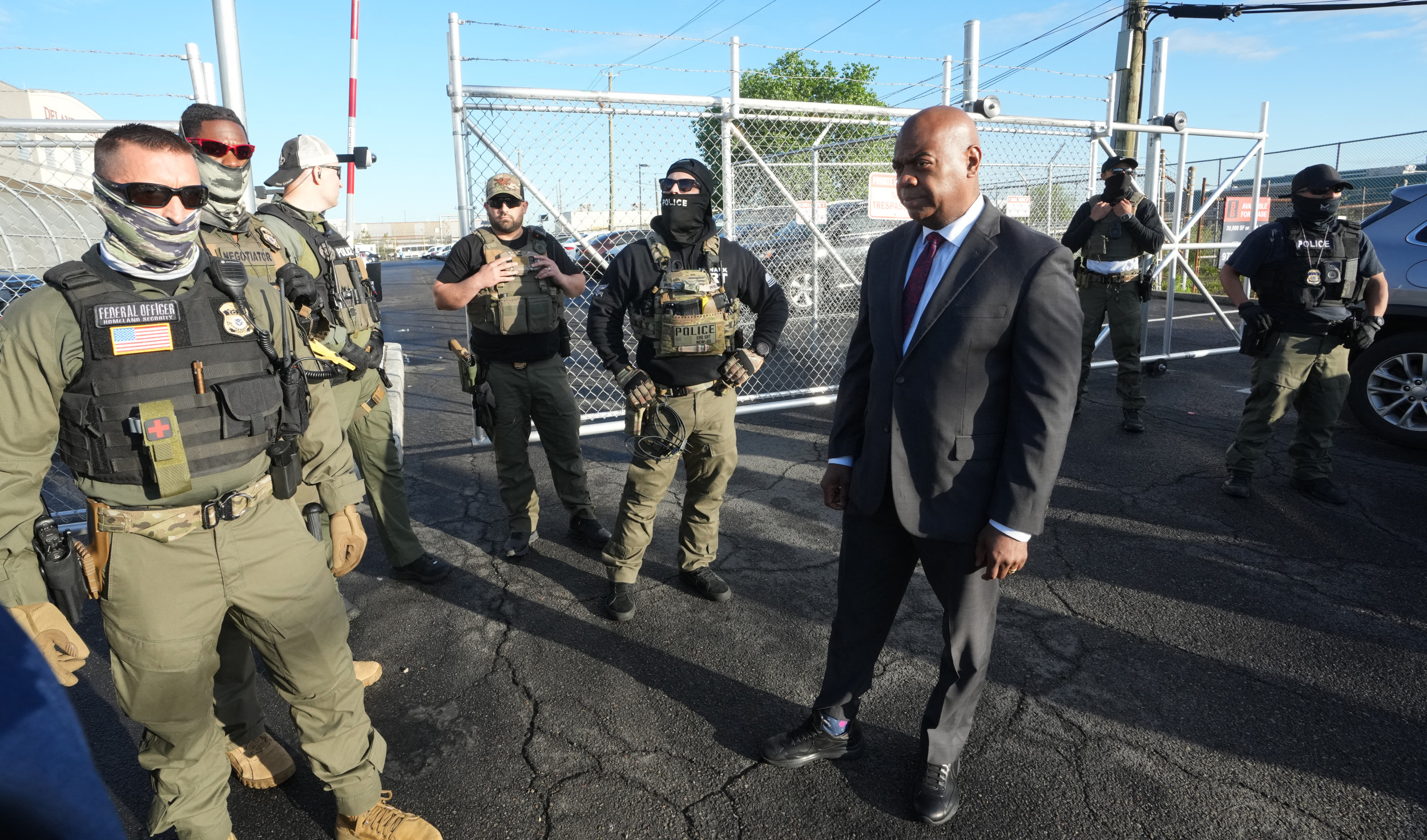
The Trump administration has confirmed it is considering arresting three Democratic members of Congress following their participation in a protest at an Immigration and Customs Enforcement facility in Newark, New Jersey.
The threat, delivered by a Department of Homeland Security official during a CNN interview, marks an extraordinary escalation in the battle between President Donald Trump’s government and elected Democrats, raising urgent questions about executive overreach, congressional oversight, and the future of political dissent in America.
The controversy exploded after the arrest of Newark Mayor Ras Baraka at the Delaney Hall detention center on Friday, where he joined several lawmakers protesting the facility’s reopening to house migrants. Those present included Representatives Bonnie Watson Coleman, Rob Menendez, and LaMonica McIver, all Democrats from New Jersey.
The group argued that the facility, operated by the private prison company GEO Group, lacks the proper permits to hold detainees. They attempted to conduct a site visit and prepare for a press conference outside the building, but were blocked by security and later accused of trespassing and assaulting ICE officers. Mayor Baraka was taken into federal custody and later released.
Tricia McLaughlin, Assistant Secretary for Public Affairs at DHS, said during a live CNN interview that federal agents are in possession of body camera footage that allegedly shows members of Congress physically attacking ICE officers, including what she described as “body-slamming a female ICE officer.”
When pressed by CNN’s Victor Blackwell about whether arrests of elected officials were imminent, McLaughlin replied: “This is an ongoing investigation and that is definitely on the table.” She added, “We’re not playing.”
The confrontation has become a national flashpoint, drawing sharp reactions from elected officials, legal scholars, and civil rights groups. Critics of the administration say the arrests and threats are part of a broader pattern of authoritarian behavior from the White House, using law enforcement to intimidate political opposition and chill lawful oversight.
Supporters of the administration argue that elected officials, like any other citizens, must respect federal property laws and that no one is above the law, even when engaging in protest.

Mayor Baraka pushed back forcefully on the characterization of his arrest, stating in a CNN interview that he was not informed by any official that he needed to leave. “I was there for over an hour in that space, and nobody ever told me to move… not a single person, not an officer from ICE, not any of the security guards, nobody told me to leave that place.”
Baraka said he was acting in his official capacity as the mayor of Newark and was there to support congressional members and speak at a planned press conference.
Representative LaMonica McIver told reporters she was assaulted by multiple ICE officers during the protest while senior ICE officials looked on. “I was physically assaulted while they stood there and said nothing,” she said.
Her colleague, Representative Bonnie Watson Coleman, has not publicly commented but a spokesperson told Axios that the threat of arrest is “another example of this administration abusing its power to try to intimidate anyone who stands up to them.”
In a statement released on X, formerly Twitter, New Jersey Governor Phil Murphy expressed outrage at Baraka’s arrest. “Relieved to see Mayor Baraka released from federal custody, but the bottom line is he never should have been detained in the first place,” Murphy wrote.
Meanwhile, Interim U.S. Attorney for the District of New Jersey Alina Habba, who previously served as a personal attorney to Trump, defended the arrest. “The Mayor of Newark, Ras Baraka, committed trespass and ignored multiple warnings from Homeland Security Investigations to remove himself from the ICE detention center in Newark, New Jersey this afternoon.
He has willingly chosen to disregard the law. That will not stand in this state. He has been taken into custody. NO ONE IS ABOVE THE LAW,” Habba wrote on X.
The situation escalated further when the Congressional Hispanic Caucus released a blistering statement accusing DHS of institutional corruption and warning that the department’s actions could leave a permanent stain on federal law enforcement.

“The Trump-Vance Department of Homeland Security (DHS) would be well advised to reconsider its entire approach to interior enforcement,” the statement read. “This administration is leading us down a dark path and putting an indelible stain on every institution, badge and public official that no presidential pardon will or should ever wash away.”
The group added, “Reps. Menendez, Watson Coleman and McIver were performing their oversight duties when they were accosted by rogue agents. DHS leaders not only failed to rectify the problem, they amplified it, making clear for all that the rot in this department comes straight from the top. The CHC and its allies will not be intimidated. We are keeping tabs and we will have accountability.”
The legal basis for any potential arrest of a sitting member of Congress remains murky. Members of Congress have broad constitutional protections when conducting official business, including oversight visits to federal facilities. While lawmakers are not immune from criminal prosecution, the use of federal law enforcement to arrest legislators for exercising oversight powers could trigger a major constitutional clash.
Legal experts note that prosecuting members of Congress for performing their duties would be unprecedented and could ignite legal challenges that test the limits of executive power.
President Trump, who has made hardline immigration enforcement a cornerstone of his second term, has escalated deportation efforts using the rarely invoked Alien Enemies Act. The law, originally passed in 1798, allows the president to detain or deport noncitizens from hostile nations.
Trump used the authority within his first 100 days in office, though its implementation has been blocked by multiple courts. His administration’s aggressive tactics, especially those involving families and children, have drawn criticism from human rights groups and prompted court challenges over due process and humane treatment.
DHS has defended its actions, saying detainees have been offered options that avoid family separation. In a statement, the department claimed that “rather than separate their families, ICE asked the mothers if they wanted to be removed with their children or if they wanted ICE to place the children with someone safe the parent designates.”
But the broader backlash against these tactics has grown, especially as the administration appears willing to escalate its conflict with elected officials who challenge its policies.

Adding to the controversy, the Trump administration has already released partial body camera footage from the Newark incident on social media, a move seen by some legal analysts as an attempt to shape public opinion before any judicial proceedings.
Civil rights groups are now demanding the full, unedited footage, citing concerns over selective editing and misrepresentation of events. The footage released so far does not clearly show physical altercations between lawmakers and ICE officers, and Democrats have accused the administration of distorting events to justify politically motivated arrests.
Mayor Baraka has responded by announcing that the city of Newark will sue GEO Group, the private prison operator managing the Delaney Hall facility, over alleged permit violations and inspection failures. His legal team has indicated that the city is also exploring options for challenging the legality of his arrest and the potential charges against the Democratic lawmakers.
The standoff in Newark is quickly becoming a symbol of a broader struggle over the balance of power between the executive and legislative branches. If the Trump administration follows through with its threats to arrest members of Congress, the consequences could be explosive. It would likely trigger a constitutional crisis and unleash a wave of political backlash that could stretch across all three branches of government.
For now, all eyes are on DHS and the Justice Department to see whether they will press forward with charges. The Biden-era Justice Department declined to pursue criminal charges against Republicans who defied congressional subpoenas.
But Trump’s DOJ, under acting officials and political allies like Alina Habba, appears to be taking a far more aggressive approach. If charges are filed, they will almost certainly be challenged in court — and the outcome could redefine the limits of federal law enforcement in a politically polarized America.

What started as a protest against a private immigration detention center in Newark has evolved into a full-blown political and legal showdown, with potential consequences for congressional authority, federal-state relations, and the constitutional boundaries that define American democracy. The administration’s posture suggests it is prepared to test those boundaries, but it is far from clear whether the courts — or the American people — will let them get away with it.



